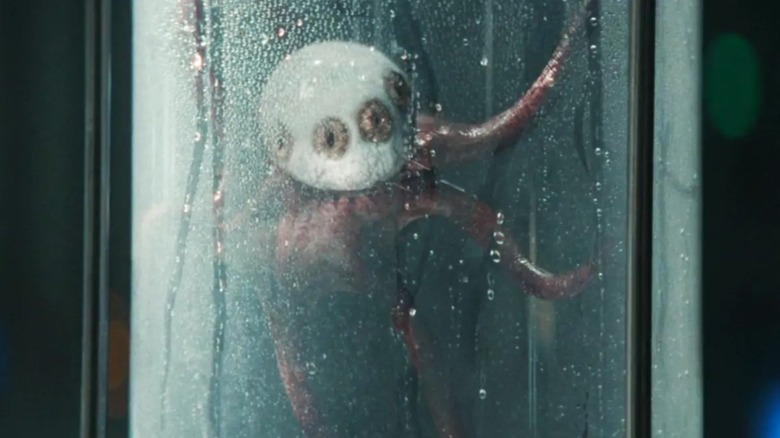Alien: Earth Episode 5 Explains Some Of The Show's Biggest Mysteries
This post contains spoilers for the fifth episode of "Alien: Earth."
The crash of the USCSS Maginot is the inciting incident in "Alien: Earth," as all hell breaks loose from that point onward. A fierce conflict of interest is created between corporations Prodigy and Weyland-Yutani after the latter's deep-space exploration vessel crashes inside the Prodigy-controlled city of New Siam. The first few episodes of the show had already established two key facts about the crash: There have been no survivors except the shrewd cyborg Morrow (Babou Ceesay), and the collision had caused every alien specimen onboard to break out of confinement. Despite the massacre that takes place in episode 2, hybrid Wendy (Sydney Chandler) and company manage to capture and contain the specimens, much to the chagrin of Morrow, who wants to retrieve these creatures at any cost.
We do see glimpses of what happened aboard the Maginot in the first four episodes, but these visual clues are strewn haphazardly across the narrative and do not form a cohesive picture. Episode 5 (titled "In Space, No One...") tells us exactly what happened pre-crash, shedding an even more concerning light on the events that led up to the evolving story. We're properly introduced to the crew onboard, including second-in-command Zaveri (Richa Moorjani) and scientist Chibuzo (Karen Aldridge), and it seems that everyone took turns to be put into cryosleep to keep things streamlined during their long voyage. Unbeknownst to them, there's a saboteur on board, which accelerates the speed of the crew's demise, along with the tragedy that could've easily been avoided with a sliver of competence.
I've been pretty lukewarm about "Alien: Earth" so far, as its fresh premise is often marred by hackneyed execution and inconsistent worldbuilding. However, episode 5 succeeds in creating (and sustaining) a genuinely tense, claustrophobic atmosphere, which (unfortunately) dissipates the moment we return to the present storyline. Let's dig deeper into what this episode gets right, and why the standard aliens-running-amok-aboard-a-spaceship formula always works in favor of the "Alien" franchise.
Alien: Earth uses its flashback episode to pay homage to a classic premise
The crew aboard the Maginot does not come across as particularly interesting (save for Morrow, whose motivations become progressively sinister as the crash becomes imminent), as they are afforded very little time to make a strong impression. Moreover, some of them are completely unlikeable: Teng (Andy Yu) is unambiguously set up as someone who sexually harasses female crew members, and he seems disgustingly fixated on a woman in constant cryostasis. While everyone on board is aware of this disturbing behavior, no one makes any real effort to prevent or push back against Teng's creepiness. Even before the alien specimen-related issues start occurring, Teng's discomfiting presence hovers over the spaceship at all times, as it becomes abundantly clear that this environment has never been safe to begin with.
Episode 5 takes its time lingering on every crew member, but more time spent with these people only serves to highlight their startling professional incompetence. There's junior engineer Malachite (Jamie Bisping), who absolutely does not belong on a deep-space exploration mission because he is unaware of basic concepts due to the lack of an education. While this is more of a Weyland-Yutani oversight, Malachite's ignorance adds to the cocktail of poor decisions that dooms everyone on board, as no one seems capable of overseeing the craft when things get dire.
To make matters worse, a saboteur is going around setting fires and breaking equipment, preventing the ship from functioning as intended. Morrow is the only crew member who makes any meaningful effort to take control of the situation, as he quickly finds out that chief engineer Petrovich (Enzo Cilenti) is in cahoots with Prodigy leader Boy Kavalier (Samuel Blenkin). By the time Morrow intervenes, it's too late.
The most intriguing aspects of the episode lie in the interplay between human folly and creature-focused horror, as the alien specimens actively work together to push the crew towards ruination. The blood-sucking critter lays eggs in a water bottle, the face huggers latch onto whoever they can, and the eyeball monster uses its sinister intelligence to break free and wreak havoc. Soon, a fully-grown Xenomorph is on the loose, replicating the best beats of every "Alien" title preceding the series.
Alien: Earth's best episode uses familiar franchise beats to elevate the stakes
Nothing that happens in episode 5 is novel or groundbreaking — if anything, the familiarity of the premise plays off rather well against our foreknowledge of the events to come. We've seen such onboard tragedies innumerable times, but the focus here seems to be on the ferocity of the organisms as opposed to humanity's naive will to persist, as every human onboard feels expendable to us. We know Morrow is going to survive, so there's little anxiety surrounding the decisions he makes, even when he has little regard for the lives of his crewmates. Everyone else is inevitably marked for death. Some are violently torn apart from the inside, while others are controlled by the eyeball creature to menacing effect.
Even so, the episode highlights the complex relationships between various alien species, as the eyeball monster and the Xenomorph get into a brief showdown that indicates their disdain for each other. While this instinctive enmity isn't explained further, it is an interesting dynamic that might be revisited somewhere down the line, planting the seeds for a conflict worth exploring. I still maintain that every non-Xenomorph monster has been underwhelming in the show so far, but the eyeball monster has proven itself to be a dangerous contender, as it is both ruthless and manipulative. These fresh additions revitalize established franchise tropes about these perfect organisms, while redefining what it means for non-alien species to come in contact with them.
Episode 5 might feel a tad predictable at times, and it's far from perfect, as it raises more pressing questions that are left unanswered. But it packs more intrigue and punch than the ongoing story in "Alien: Earth," which is a concern because the series has effectively swerved away from the traditional space horror formula (which is a good thing) but has failed to pull off these elements with conviction. This is undoubtedly an execution problem, as the premise is conceptually sound and should've worked pretty well with the help of the actors' committed performances.
These creative risks might still pay off in the upcoming episodes, morphing "Alien: Earth" into a promising entry that dares to experiment with the "Alien" mythos and heighten the stakes like never before. Fingers crossed.
The first five episodes of "Alien: Earth" are currently streaming on FX on Hulu.


